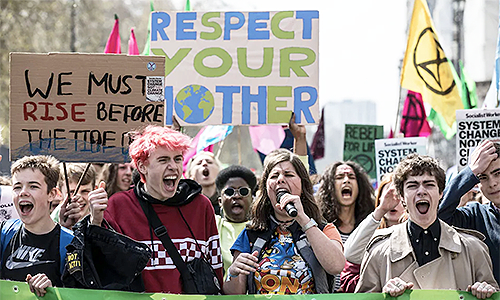
by ROGER CROOK – IN LIFE, cream rises to the top – the clever people do the jobs which clever people do, while the rest of us get on, as best we can, with whatever our calling happens to be.
Fresh milk naturally separates when left to cool. The cream is its most valuable constituent from which butter and cheese can be made.
- When was it decided that all the effort to build a nation in just a couple of hundred years, was not worth fighting for?
- The homogenisation of society was started during the Hawke period.
- He devalued uni degrees and doctorates – turning diplomas into degrees.
It is a delicacy to be valued; it can be added to other foods, like strawberries (with a little caster sugar?) on a summer’s day to please the senses.
The bulk of the milk, with a little cream that is left after the rest has been taken away, is what we the masses use for all the other purposes we use milk for, like on our cereals and in our tea and coffee.
I grew up with the analogy that in life cream rises to the top.
My first experience of this order of life happened at the age of 11 in post-World War II Britain.
Back then, all boys and girls were subjected to an examination called the Eleven Plus. I remember hearing my father saying there were only seventy scholarship places at the grammar school and over five hundred sitting the exam.
At that age I knew the price of failing the Eleven Plus; it was the Secondary Modern School of several thousand children on Mersey Side, an area not known for its gentility.
It had classes of more than fifty and an unenvious reputation for bad behaviour, even rebellion against the teachers.
The prospect of failing that exam and what would happen if I failed, caused me to vomit; I had the privilege, like my brothers, of private school education from age five to 11, now the big test; had the sacrifices of my parents been worth it?
I failed, I was not one of the seventy out of five hundred; at age eleven my future was determined by one test of reading, writing and arithmetic.
We, the lesser ones, the failures, accepted that those who got the scholarship to the grammar school were cleverer than us; we knew even then, if they were really clever, they would go on to university, because in our world in the fifties, universities were for the cleverest of the clever.
For those of us who failed it meant leaving school at 14 or 15. In industrial England, the majority of boys became apprentices to a trade.
The girls went to work in the factories or worked in an office and went to secretarial college several nights and one day a week to learn to type and take shorthand.
For most apprentices it meant school two or three nights a week after work, (a workday was usually 8 hours) and one whole day a week for at least five years.
Some apprentices who excelled gained a mature entrance scholarship to a college or university; the cream, again, rose to the top.
Universities and colleges were largely free, so the State was paying for its cleverest young people to excel and provide the brains and leadership a post-war economy needed.
Those young people were taught by men and women who in those days were revered for their knowledge; letters after their names meant something, a degree was admired, a PhD celebrated, and professors were held in awe and listened to.
Yes, there was a class system in education, but not one based on wealth or breeding and private education as it had been in the past, but on brains.
HOMOGENISED
When milk is homogenised, it is heated and subjected to mixing at a very high speed. This mixes the cream with the rest of the milk so that they become one. The cream is indistinguishable from the rest; it all becomes milk.
When I came to Australia nearly sixty years ago, it seemed to me that Australia had a way of life similar to that which I had left behind.
Moving from rural England to the wheat belt in Western Australia, subjected my wife and I to a culture shock. We lived among a community that had cleared the land on which they farmed.
We had left a community where the land was as old as the ages, dry stone walls had been built in the most improbable places to delineate little fields and we didn’t know who had done the work, we just knew it had been done, by hand, and with horses and little ponies carrying the stones in baskets on their backs.
We had left behind the rich brown earths of the arable fields in Nottinghamshire, once covered with oak trees, which were cut down to make ships and the land cleared in the Middle Ages to grow food; antiquity was everywhere.
The parents of our new friends, like our parents back in the UK had lived through a world wars. Many, like my parents, had been born during World War I, had survived a flu pandemic and the Great Depression and then the Second World War; they were hardened by what had happened during their lifetime.
This was an Australian wheatbelt society into which we had been transported, a society far away from academia, but a society where the cream had risen to the top and built a nation.
These people were not the brains of the land in the conventional sense, they were not academic; they were pioneers.
Their pioneering spirit was expressed in every little town; they all had a footy oval and a bowling green, a tennis court, a Shire Office, and a pub; all built by the community; a community obviously, fighting fiercely, for a secure future.
There was not a university degree in sight, yet it was no place for the faint hearted, the cream, not by academic standards, but by the strength of character and determination had risen to the top.
The question then is, when were we, as a society, homogenised? When was it decided that we are all the same? When did someone decide that we could all be cream and nobody should be milk?
When was it decided that all of that effort to build nation in just a couple of hundred years, was not worth fighting for? When was it decided and by whom, that there was no such thing as the ‘cream’ in society?
The homogenisation of society was started, I believe, during the Hawke period, and the architect of this massive change in social values was none other than Christopher Dawkins as Minister for Education.
He devalued university degrees and doctorates. He turned diplomas into degrees. Would be teachers studied for three year to get a degree instead of two years for a diploma and as history now shows, gradually the standard of education of our children has declined.
Dawkin’s philosophy was everyone gets a prize.
Our universities are full of degree courses which in the years gone by would not have qualified for a diploma.
The most extreme is the lady who represented Australia at the Olympics in break-dancing, Dr Rachael Gunn.
She gained her PhD in break dancing and dance culture. How many taxpayer dollars went into helping this lady qualify and how is she paying back that commitment we all made to her?
There are so many useless degrees; take degrees in journalism and communications. Aspiring young people go to university to be lectured by tutors, which research has shown will be from the Left of the extreme Left of the political spectrum.
The results are here for us all to see; the Australia media from the ABC to Channel Nine to the majority of newspapers now leans or is from the Left and they “doctor” the news to fit their political leanings.
That is what the cream feeds to the milk, bias and disinformation.
The greatest journalist I have ever known was a country boy from a big family, so he got a job as a copy boy with The West Australian. He finished up being the managing editor. Vale Fred Moroney.
USELESS DEGREES
Just a few more silly and useless degrees. A degree in travel and tourism. Advertising. International studies. Child and family studies. It’s worth half an hour looking at where your tax dollars are being spent and wondering whether that money should go to a better cause.
Universities have become bloated and powerful institutions living on the taxpayer dollar.
Now we are short of tradesmen and women. The people who can make and build what we need.
We are now told we have to import the people we need because they are young and will have children.
Like Australia forty years ago, America always impressed me with the belief the people had in themselves and their country.
In America, the Stars and Stripes was flown from homes in every street and from every building.
In Australia there was a belief we could beat anyone at anything, not just cricket. There was a steeliness of the ANZAC through the nation; there was just one flag and one united people, with a character that was beyond politics.
President elect Donald Trump’s “Make America Great Again” has stirred the majority of the American people to the extent that the majority voted for him.
He has promised to return that great nation back to what it was in the memory of so many Americans.
Just as importantly and I think missed by many, the young, the Black people and the Latinos voted for Trump in numbers never seen before.
It was not the cream that elected Trump, but the milk, the majority of Americans.
POWERFUL
Those who considered themselves to be the cream of America, the President, the government agencies, the intelligentsia, almost to a man and woman, many of the rich and almost all of the famous, many from Hollywood, and virtually all of the powerful mainstream media, all intent upon bringing Trump down, were ignominiously and soundly, defeated.
The cream of America sought greater power and became ‘clotted’ in the process. (Sorry about that, it had to come in somewhere!)
The socialist clots were defeated by the ordinary people of America, who responded to the call from Trump, to “Make America Great Again”.
Is it possible to reinvigorate Australia to where it was when my wife and I came here nearly sixty years ago?
Is it possible to bring back national pride that extends beyond a sports team or an Olympic games? Can we stand again, united before one national flag?
Can we again show the world that we are a big country with few people; that we are proud of our history, recognise both the good and the bad in our past, and that our history will not hold us back in the future because we are proud of our country and our nation?
Do we have the leaders who can impress upon the people that the birthright of all Australians is second to none in the world; and that to ignore that wealth of natural resources will be to deny future generations the fruits of endeavour and bloody hard work made by so many over the generations?
The answer is, I don’t know.
I see a country that has been on easy street for too long. I see a country where the basic needs of all Australians have been ignored by successive governments, and I see a people who have not called them to account.
CRACKER
That we cannot house our people is a disgrace. That we no longer have a manufacturing sector worth a cracker, is more than regrettable as we contemplate our reliance on other nations for the very basics of everyday life.
That we cannot even notionally defend ourselves is unbelievable – but it is an indisputable fact. The ANZACS are watching with tears in their eyes and asking why, why?
The fires of race and religion have been lit. Antisemitism is rife, and our Federal Government is turning a blind eye and betraying the people, it seems for a mess of pottage from Allah come election day. (Genesis 25: 29-34)
Is Dutton the man and is the Coalition the vehicle to cause the change that Australia must have before it sinks into a third world nation dependent on China?
If he is, then he needs to follow the lead given by Trump.
He could well take on the slogan and “Make Australia Great Again” – but to do that he must be able to remind the Australian people how great Australia once was, and with his leadership how great it can become again, and he needs to start now.PC













Your article helped me a lot, is there any more related content? Thanks!
på grund af denne vidunderlige læsning !!! Jeg kunne bestemt virkelig godt lide hver eneste lille smule af det, og jeg
When was it decided? No, it was allowed because we allowed a consistent left drift in both Liberal and Labor political parties.
Labor Right has allowed the green leftists to penetrate right up to the present PM. Liberals have progressively humbugged, trying to be all things to all people. It has failed badly. The presence of 7 teals, Green MPs and a selection of misfits in the Senate have been given entry, especially by the Coalition because of ambivalent policy and public conversation. It can be fixed.